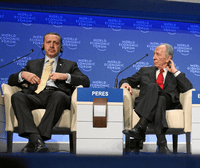In retrospect, the gradual crumbling last year of diplomatic relations between Turkey and Israel was a harbinger of some of the changes that would subsequently come to the rest of the region. For decades, Turkey was one of the few Muslim nations that had good relations with the Jewish state. Ankara maintained strong diplomatic, military and economic ties with Israel. But then democracy started gaining ground in Turkey, and when an Islamic party came to power, the relationship started to deteriorate. Now, with politicians in both countries having scored points over the rift, calculations on both sides point to the benefits of rapprochement. As a result, Israel and Turkey are working quietly to sort out their differences and mend a relationship that was once a mainstay of East-West diplomacy.
The deterioration of ties that had once seemed unbreakable began slowly, soon after the Justice and Development Party (AKP) came to power in Turkey in 2002. The moderate Islamic party, whose views reflected popular sentiment more closely than previous governments, decided to strengthen bonds with other Arab countries and to speak out forcefully in support of the Palestinian cause. Ankara's public chastising of the Jewish state won goodwill at home and among Muslims throughout the region. Despite Israel's concerns, Ankara established relations with Israel's enemies, including Syria, Iran and Hamas.
When Israel went to war in Gaza against Hamas in late 2008, the already chilly relationship turned to bitter acrimony, put on display for all the world to see. Matters continued to worsen, with diplomatic slights, canceled military exercises and heated rhetoric.

